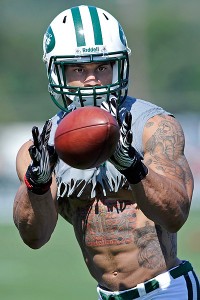When I was a little boy I would wander into my living room and find my family, eyes glued to the television screen. My mother, father, sister and grandmother were all intensely watching whatever athletic event was happening on screen. I would feign interest for a few moments before I was utterly confused and simply bored by what was happening, then plod over to my action figures and play silently in a corner.

My father, a brilliant man with a huge heart, taught me everything he knew about sports. He taught me how to throw a baseball, kick a soccer ball and pass a basketball. I treasured these moments when I was learning from someone who I looked up to as my role model.
Despite this dream, my athletic skills were lacking. My passes were all wrong and I would instinctively duck when a ball was thrown my way. I tried a variety of sports, everything from soccer to basketball, but nothing stuck. Unlike the rest of my family, I did not have a single athletic gene in my body. In fact, I found the whole concept of sports dry and dull and would much rather make up stories in my head.
So that’s what I did. I spent the remainder of my childhood writing poems, drawing pictures and reading books. When I entered middle school, I discovered acting, and I never looked back. I was fully absorbed into the beautiful world of artistic expression. I had found my home.
The only problem was society playing against me. As I grew more passionate, I also grew self-aware of how different I was from other boys around me. I did not fall into the stereotype of a typical high school male. My interests were diferent. I felt myself diverging from what I was supposed to become by society’s definition.
In our current generation, there is rarely a discussion on male identity. We are apparently predestined to fall into the niche of boyhood, following in the footsteps of our fathers and older brothers. Our generation does not discuss men’s body issues or identity struggles nearly enough to be brought into the center of popular culture.
It’s the simple truth that males, too, are struggling to find themselves. Those who do not fit into the classic image of the All-American male may feel lost and confused. Young men struggle to find themselves in this ever-changing world where deviating from the norm is still occasionally viewed as a bad thing.
Finding yourself amidst the drama, the technology and the stress of the current age is an extremely difficult task. We are so often asked: What do we want to do when we grow up? What is the next step?
We are told, “It’s early, but start planning now, the future is coming sooner than you think.” With this enormous amount of stress, we often lose ourselves in a vision of what others want us to be, rather than what we are destined to become.
As time went on, I began to find the pieces of myself. I solidified my masculinity, but in my own way. I am no longer ashamed of my deviations from the stereotype, but rather quite proud of the man I am becoming. I still do not know who I am, and I think I will spend my whole life searching. The point is that it is okay to fall outside “society’s guidelines.” No one knows who you are supposed to be. Sometimes it’s even hard to figure it out yourself. Regardless of who you are, creating a complete version of yourself is a goal that might extend much further than college. In fact, most won’t find the answer until they are long into adulthood.
We are lucky to live in a generation that is becoming so open and accepting, but we all still have a long way to go. Abolishing stereotypes and accepting our differences rather than hiding them is the first step to discovering who we really are.






